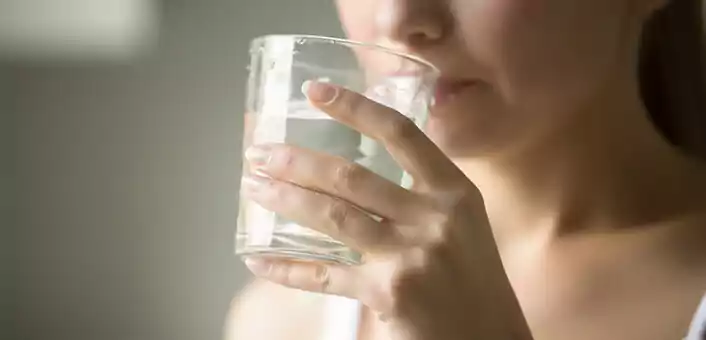PCOS test is based on the Rotterdam criteria for diagnosing PCOS.

Living Well
You’ve heard that staying well-hydrated helps your body detox, keeps appetite in check, helps you lose weight and also keeps skin supple and younger-looking. But, that’s not the only reason why you should drink 7 to 8 glasses of water every day. In fact, dehydration could be making you sick. Dehydration can cause muscle spasms, tension in your neck or jaw, constipation, vomiting, as well as more serious symptoms, like sudden heart problems. It can also impact overall mood and cognitive function, contributing to impairment in vision, perceptive discrimination, tracking, recall, attention, psychomotor skills and memory. What’s worse is that you might not be able to draw a connection between dehydration and chronic illnesses like diabetes.
Water makes up a large percentage of our blood. Oxygen and nutrients are transported throughout the body via blood. On the other hand, lymphatic fluids which remove waste products from the body, make up four times the volume of blood. As you can imagine, all body systems can become impaired if the body does not receive a continuous, safe and reliable supply of water.
What is especially worrying is that when ignored over a period of time, dehydration makes you susceptible to more serious chronic illnesses. Low water intake can lead to diabetes over time, as it increases the risk of new-onset hyperglycemia.
Mild levels of dehydration can produce disruptions in mood and cognitive functioning. According to a study conducted at St. Louis University Health Sciences Center, St. Louis, dehydration is a reliable predictor of impaired cognitive status. It is a risk factor for delirium and dementia, especially in the elderly and in the very ill. Research has found a definite statistical association between high degrees of dehydration/water volume depletion and poor mental function.
Dehydration disrupts the gastrointestinal function and is a leading cause of chronic constipation. However, dehydration is also linked to heartburn and dyspepsia. Dehydration can worsen arthritis pain as well. Water is the main lubricant of the joints and prevents arthritis, back pain and other kinds of body pains.
Triggers AllergiesOver a period of time, dehydration can aggravate allergies too. Dehydration triggers the release of histamine, making you more susceptible to allergies. Essential hypertension is often the result of gradually established dehydration. The lesser water there is in the body, the more pressure is needed to hydrate vital cells.
Another negative trait of dehydration is that it enhances pain-evoked activation in the brain. This may manifest as migraine headaches, joint pain, back pain or several other pain indicators. Dehydration can also interfere with regular sleep patterns, as it causes tryptophan deficiency, resulting in insomnia.
One more issue that dehydration results in is incomplete protein metabolism. This causes gout over a period of time as uric acid crystals collect in some joints and cause pain. The kidneys rely on water for proper functioning. Without sufficient water, the kidneys have to work overtime for filtering out waste, causing them damage.
Anyone who isn’t drinking 2 to 3 liters of water a day can become dehydrated. However, advancing age alters thirst perception, so elderly people are very susceptible to dehydration. Unfortunately, they are also more at risk for chronic illnesses, which is why drinking an adequate amount of water becomes all the more important as you age.Infants and children are also prone to dehydration since their bodies are more vulnerable to water depletion, while their need for water is greater than adults’.
Others who are more susceptible to dehydration are:
The key to avoiding dehydration is to listen to your body. If you are thirsty or have been sweating profusely, replenish your body with water immediately. If you like to exercise even in summers, make sure you always carry a bottle of water. Remember that dehydration starts to set in even before your mouth starts to go dry. So, don’t wait for severe symptoms to show before you take action. But, how will you know whether you’re drinking enough water? If you urinate every three to four hours and your urine is pale yellow in color, you’re drinking enough.
Aim to drink 3 liters of water per day. Keep these additional tips in mind:
While there is nothing better than water to keep us hydrated, sometimes, we all need a little ‘something extra’ to stay motivated to drink up!
Some great alternatives to water are:
Stay hydrated, stay healthy!
Water, Hydration and Health – https://www.ncbi.nlm.nih.gov/pmc/articles/PMC2908954/
Behaviors and Attitudes Associated With Low Drinking Water Intake Among US Adults, Food Attitudes and Behaviors Survey, 2007 – https://www.cdc.gov/pcd/issues/2013/12_0248.htm
Low Water Intake and Risk for New-Onset Hyperglycemia – https://care.diabetesjournals.org/content/34/12/2551.full
Impaired cognitive function and mental performance in mild dehydration – https://www.nature.com/ejcn/journal/v57/n2s/full/1601898a.html
ACUTE CONFUSIONAL STATES AND DEMENTIA IN THE ELDERLY: THE ROLE OF DEHYDRATION/VOLUME DEPLETION, PHYSICAL ILLNESS AND AGE – https://academic.oup.com/ageing/article-abstract/9/3/137/71109/ACUTE-CONFUSIONAL-STATES-AND-DEMENTIA-IN-THE
Water supplementation enhances the effect of high-fiber diet on stool frequency and laxative consumption in adult patients with functional constipation – https://www.researchgate.net/profile/Riccardo_Marmo/publication/13601287_Water_supplementation_enhances_the_effect_of_high-fiber_diet_on_stool_frequency_and_laxative_consumption_in_adult_patients_with_functional_constipation/links/02e7e53bad73254353000000.pdf
Mild dehydration: a risk factor of constipation? – https://www.nature.com/ejcn/journal/v57/n2s/full/1601907a.html
Water: An Essential But Overlooked Nutrient – https://jandonline.org/article/S0002-8223(99)00048-6/fulltext
A Glass of Water Immediately Increases Gastric pH in Healthy Subjects – https://link.springer.com/article/10.1007/s10620-008-0301-3
Dehydration’s Hidden Symptoms – https://www.kokopelliswellness.com/wordpress/DehydrationHiddenSymptoms.pdf
Dehydration Enhances Pain-Evoked Activation in the Human Brain Compared with Rehydration – https://journals.lww.com/anesthesia-analgesia/Abstract/2014/06000/Dehydration_Enhances_Pain_Evoked_Activation_in_the.23.aspx
Association between Water Intake, Chronic Kidney Disease, and Cardiovascular Disease: A Cross-Sectional Analysis of NHANES Data – https://www.karger.com/article/FullText/350377
Influence of age on thirst and fluid intake – https://www.ncbi.nlm.nih.gov/pubmed/11528342